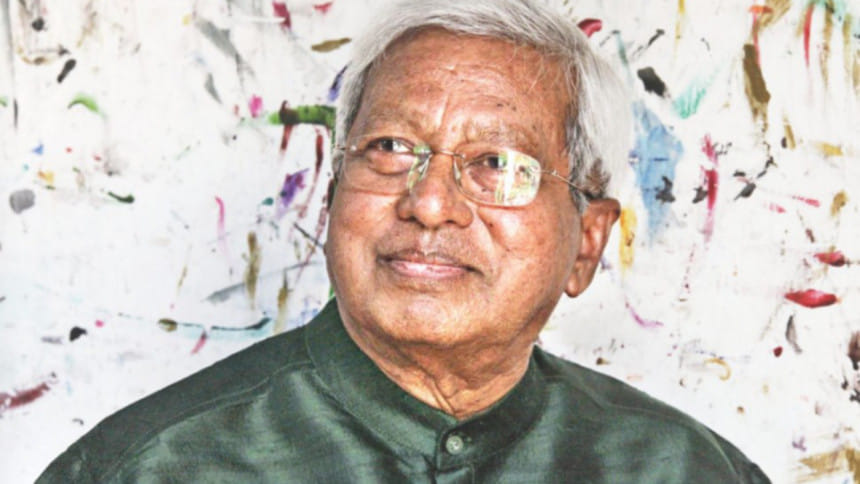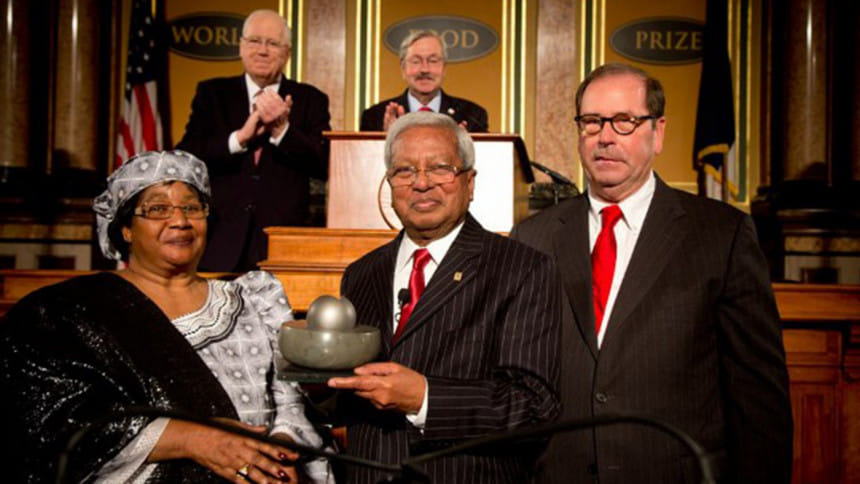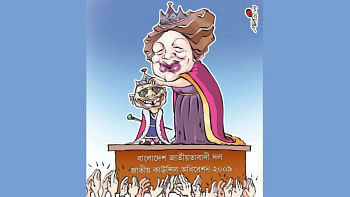A force larger than life

Lord Campden is what his friends would call him, in the heady days that lie between youth and adulthood. He was a sharp dressing, cigar smoking, culture-loving European aesthete—a finance executive leading a privileged life in London, one of the great world cities.
Yet the pull of his roots was too strong, a sense of purpose too keenly felt, and despite his many honorifics—actual this time, bestowed not by the affection of friends, but by world governments—posterity will remember him as Abed bhai, a hero who worked relentlessly for his people, a visionary who devoted his life to the progress of his nation, a dreamer whose dreams would inspire the world.
A Tagore lover, Sir Fazle always nurtured his love for his land. Thus, after studying naval architecture in Glasgow for two years, he decided to study accounting instead, because he wanted to come back to his homeland and work for its betterment. Studying naval architecture might not have provided him with any job opportunity in his country.

Sir Fazle joined Shell and rose to the position of its finance head for the then East Pakistan. And things for him were going well.
And then the 1970 Bhola Cyclone happened, which changed his outlook on life. The cyclone claimed around 500,000 lives. "I was really shaken", Sir Fazel said, while discussing his encounter with lifeless bodies floating in the bay, in an interview with the non-profit media organisation National Public Radio (NPR).
While speaking at "Fortune—Time Global Forum" about it again, he said, "Suddenly, I thought the life I was leading had no meaning at all. I was so disconnected from the poor like this." And in the aftermath of the devastating cyclone, with a few friends, Sir Fazle found HELP to support the affected people in rebuilding their lives.
During the 1971 Liberation War when Shell wanted Sir Fazle to act as the liaison officer between the company and Pakistani army headquarters, he tendered his resignation as a protest against the atrocities being committed by the Pak army against his people, "In view of the situation in East Pakistan, it is no longer possible for me to continue to serve Pakistan Shell Oil Company…Therefore, I would like to tender my resignation effective immediately", read his resignation letter.
And to be able to better contribute to the Liberation War, Sir Fazle went to London to lobby with European governments for the freedom of his motherland.
Soon Sir Fazle had to sell his house in London to support himself and his activities. And after the victory of Bangladesh in December 1971, Sir Fazle returned to Bangladesh with the aim to help the 10 million people who were coming back home from India—where they had sought refuge in India during the war—only to find their belongings lost to the war. During an interview with NPR Sir Fazle said, "There were 10 million refugees starting to go back to Bangladesh and I decided it's time for me to help independent Bangladesh."
And with this in mind and the money he had from selling his house in London, Sir Fazle recruited a band of young people to embark on this challenging journey with him. Brac as we know it today was formed in 1972.
One might ask, what drove a successful man to give-up his coveted job and comfortable life to undertake a journey marked by struggles. "The greatest influence on me about people's lives and poverty was my mother. She was very concerned about poverty and poor people and she tried to help them as much as she could," Sir Fazle recollected in an interview with "NextBillion", an open forum for development through enterprise sector, based at the William Davidson Institute at the University of Michigan.
"[After starting Brac] I got to know poverty first-hand in the villages of Bangladesh. I became more aware of the multidimensional aspect of poverty. It's not just lack of income, it's lack of opportunities, lack of healthcare, lack of education. It's all kinds of deprivation that constitutes poverty. Ultimately, it's also powerlessness to do something about poverty, how to come out of it", Sir Fazle added.
The visionary soon realised that in order to change the fate of the poorest of the poor, he would need a multifaceted plan, "You know people were so poor I decided I would have to commit myself for the long haul to get poverty reduced in Bangladesh", Sir Fazle recounted while talking to NPR.
One of his first initiatives was reducing the country's staggering number of infant and child mortality. Back in the day, almost one fourth of children died before the age of five. And one of the ways to combat this was introducing and promoting the oral re-hydration therapy (ORT) programme targeting ultra-poor women in Bangladesh in order to fight-off diarrheal disease, which in the 80s, was the second leading cause of death in children under five. "We went to every household in Bangladesh teaching mothers how to make oral rehydration fluid at home to combat diarrhoeal deaths", the visionary later recalled, as printed by The Guardian.
At the same time, Sir Fazle also initiated the immunisation programme for children, thanks to which immunisation rate of children saw a dramatic increase, from two percent to 70 percent between 1986 and 1990.
Sir Fazle strongly believed that "giving attention to women and girls was important" and he worked relentlessly for economic and social empowerment of women all his life. He realised that empowering women would play a crucial role in alleviating poverty.
During an interview with "Soul of Finance", when Sir Fazle was asked what the face of ultra-poverty in Bangladesh looked like, he replied: "Ultra-poverty is a woman-led household, with children. The woman does not have many skills, so she would get domestic work or very low paying agricultural work. She doesn't get paid properly. She probably gets food for her work. She shares her food with her children, so she's half fed and her children are half fed...My conception of ultra-poverty is that she's trapped, she's avoided by people, she's marginalised, her kinship relationships are very fragile. This poverty passes to the next generation. Her children start working at 7 or 8, they have no school, so they also would be at the bottom of the pyramid. They are malnourished; they are stunted. They end up repeating the cycle, because with no education they cannot get good jobs, so they also become domestic or low-paid agricultural workers."
It is this Sir Fazle tried all these years to eradicate. Brac initiated multiple programmes, including the graduation programme to help ultra-poor families "graduate" out of extreme poverty. Brac has distributed USD 1.5 billion in micro loans and helped millions of people come out of poverty. In order to make micro finance sustainable, Brac not only gave out the loans or transferred assets to them—cows, goats—but also provided grace period to the borrowers, stood beside them with stipends, counselling and support to enable them to make the best use of resources. This way, hundreds and thousands from the extremely poor category transformed their fortune.
"Everything we did in Bangladesh we did with one focus: getting poor people out of poverty because we feel that poverty is dehumanising", Sir Fazle said while talking to The Guardian.
Sir Fazle, the visionary, took up multiple projects, including health, agriculture, among others, to help the people of his country grow and prosper.
And then there were his programmes on education. Brac's Early Childhood Development (ECD) and Centre for Play programmes are designed to provide learning opportunities to children, especially in the early years. The play-based programmes are especially effective for refugee/displaced children who need help to recover from trauma. Brac runs 656 play labs in Bangladesh, Uganda and Tanzania, helping around 11,500 children every day.
Then there are Brac's pre-primary and primary schools. According to a statement from Brac, more than 12 million children have graduated from these schools. Apart from this, over the last 40 years Brac has directly contributed to the education of more than 10 million students at varying levels.
When Sir Fazle saw three million Afghan refugees returning to their homeland, he realised that the same model of support—microfinance, healthcare, education—that he had successfully implemented in Bangladesh might help the people in Afghanistan in carving better lives for themselves.
This gave him the confidence that many of the projects that had been successful in Bangladesh, might be successfully implemented in other countries as well. And Brac—now a billion-dollar organisation—operates in 14 countries, touching the lives of millions of helpless people worldwide.
The lover of Tagore wanted to spread the joy of our culture to every person of this country. "When I think about Bangladesh, I think about everybody. Not everybody is enjoying Rabindranath and the great literature and culture that Bangladesh has. But I think everybody has got the right to have this experience", Sir Fazle said in a short documentary on him shared by Brac. And so, the unyielding hero travelled to the far corner of his country, in order to directly reach the poorest of the poor and understand their problem. He had seen first-hand the sufferings of the people and had worked relentlessly to give them a better life, a better future. Sir Fazle was always full of hope—hope of brighter days and better lives. Till the end, Lord Campden himself liked to dress well and listen to good music.
Sir Fazle has been showered with honorifics and awards by different states and esteemed national and international organisations. In 2009, he was appointed Knight Commander of the Most Distinguished Order of St Michael and St George by the monarchy in Britain, for his relentless contributions to the alleviation of poverty worldwide. And just last month, he was honoured with the Officer in the Order of Orange-Nassau by the Dutch monarchy—King Willem-Alexander of the Netherlands bestowed upon him the insignia of the Royal Knighthood—for the same cause.
The World Food Prize; Spanish order of Civil Merit; Leo Tolstoy International Gold Medal; Lego Prize; Thomas Francis, Jr Medal in Global Public Health; Trust Women Hero Award; Inaugural WISE Prize for Education; Palli Karma Shahayak Foundation (PKSF) Lifetime Achievement in Social Development and Poverty Alleviation; David Rockefeller Bridging Leadership Award; Gleitsman Foundation International Activist Award; Olof Palme Prize; and Ramon Magsaysay Award for Community Leadership are some of the awards Sir Fazle had been honoured with during his lifetime.
Bangladesh's growth trajectory is in an upward curve. The country is registering seven percent growth, it has made significant progress in combating maternal and child mortality, its literacy rate has increased manifold, and the country is seen as a pioneer in successfully promoting economic empowerment of women through a successful microfinance programme, that many other countries are using as a model. Sir Fazle Hasan Abed's life's work has left an undeniable imprint on many of these achievements.
It is heart-wrenching that one of the best and the brightest of this country has not been able to witness the graduation of Bangladesh to a middle-income country. But he will live on among us through his works that have benefitted millions of people—who otherwise would have had no chance at a better life—that has helped his country in its journey towards prosperity.
So, what happens when an unstoppable force meets an immovable object—the abject poverty that the newly born Bangladesh had been mired in 1971, the many stubborn challenges that were standing in its way towards progress? In Sir Fazle's case at least, the object turned out to be movable after all.
Abed bhai will live on in our memories, in our hearts and in the history of this nation.
Adieu, champion; adieu, hero!
Tasneem Tayeb works for The Daily Star.
Her Twitter handle is: @TayebTasneem

 For all latest news, follow The Daily Star's Google News channel.
For all latest news, follow The Daily Star's Google News channel. 



Comments